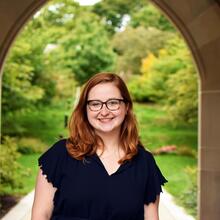A Reflection for the Memorial of St. Boniface, Bishop and Martyr
Find today’s readings here.
“Father, they are your gift to me.”
Writing one of these reflections is a treat when it falls on a saint’s feast day. It’s often a chance for me to dig into a bit of church history, a bit of world history and a bit of legend as it relates to the saint of the day. Today the church remembers St. Boniface, an English Benedictine monk who is known for his missionary work in eighth-century Europe.
In my saint fact treasure hunt, I discovered things about Boniface’s European context and his surviving writings. I even discovered a story about him “inventing” the beloved tradition of the Christmas tree.
Reading about him, you get the sense that you notice when learning about many of the church’s venerated saints: They lived full and complex lives. Their zeal brought them to many fascinating places. Faith remained at the center.
When you look at them, it makes perhaps the most striking line in today’s Gospel a bit easier to wrap your head around.
In the Gospel reading from John, Jesus speaks directly to God the Father in prayer. He talks about unity, between himself and his Father, but also in humanity. When referring to the people who will know and believe in God through him, he says a line that woke me up and made me really listen.
“Father, they are your gift to me.”
We know Christ is God the Father’s gift, his sacrifice, for us. How often do we think of ourselves, of humanity, as a gift for Christ?
In the moment of this prayer, Jesus is surrounded by his disciples. In an immediate sense, they are the humanity before his eyes, and they are the gift he speaks about. Their presence, their friendship, their questions give him life and deepen his own human experience. They’re not perfect, but I can understand why Jesus sees them as divine gifts.
When I think about today’s feast day and I consider the lives of the saints, I can also see divine gifts. I see bravery, self-sacrifice, love, mission. I see richness and color in these lives. Again, they’re human; they’re not perfect. But it’s not hard to see them as gifts.
Even when I look around at the people in my own life, the element of divine gift is obvious. The friends and family, the coworkers, the fellow city-dwellers—they vivify my days in a way nothing else does. Accepting them as God’s gift to me is second nature.
But it’s hard to accept that I am in some way a gift to God—from God. We see ourselves in all our imperfections, in all the things that seem to make us unworthy of God and unlike God. Thankfully, the gift is more visible to me in the grace-filled lives of others. It’s a reminder that our humanity is a gift, a hand outstretched to a God who becomes human.
Take a moment today to appreciate the gift of the people in your midst. Take another to recognize yourself not just as a gift from God, but also to God.







